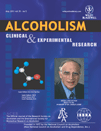Increased discounting of delayed rewards may be a premorbid characteristic and possible risk factor for alcohol and other drug use disorders; however, previous studies have found no or minimal differences in delay discounting in individuals at risk for substance use disorders based on family history. It is possible that increased delay discounting may be more closely associated with antisocial traits, evident in a subset of individuals with positive family histories of alcohol and drug use disorders, and that previous studies were underpowered for detecting subtle to modest overall group differences.
In this study, we compared 143 young adults with family histories of alcohol and other drug use disorders (FH+) and 155 young adults with no such histories (FH−) on delay discounting and subsequently examined how delay discounting was related to antisocial traits and other selected psychological and demographic variables.
The FH+ group discounted delayed rewards more than the FH− group. Subsequent analyses revealed that increased delay discounting was correlated with having more parents and grandparents with alcohol and drug use disorders, more antisocial traits, more depressive tendencies and lower IQs, and lower income. After controlling for all these relationships, more antisocial traits and lower IQ still predicted greater delay discounting, and subsequent analysis revealed that the greater delay discounting in the FH+ group was mediated by this group’s greater number of individuals with antisocial traits.
FH+ individuals who discount delayed rewards more may be at increased risk for developing alcohol and other drug use disorders; however, additional descriptive studies and longitudinal studies are needed.
Read Full Abstract
Request Reprint E-Mail:
Read Full Abstract
Request Reprint E-Mail:
